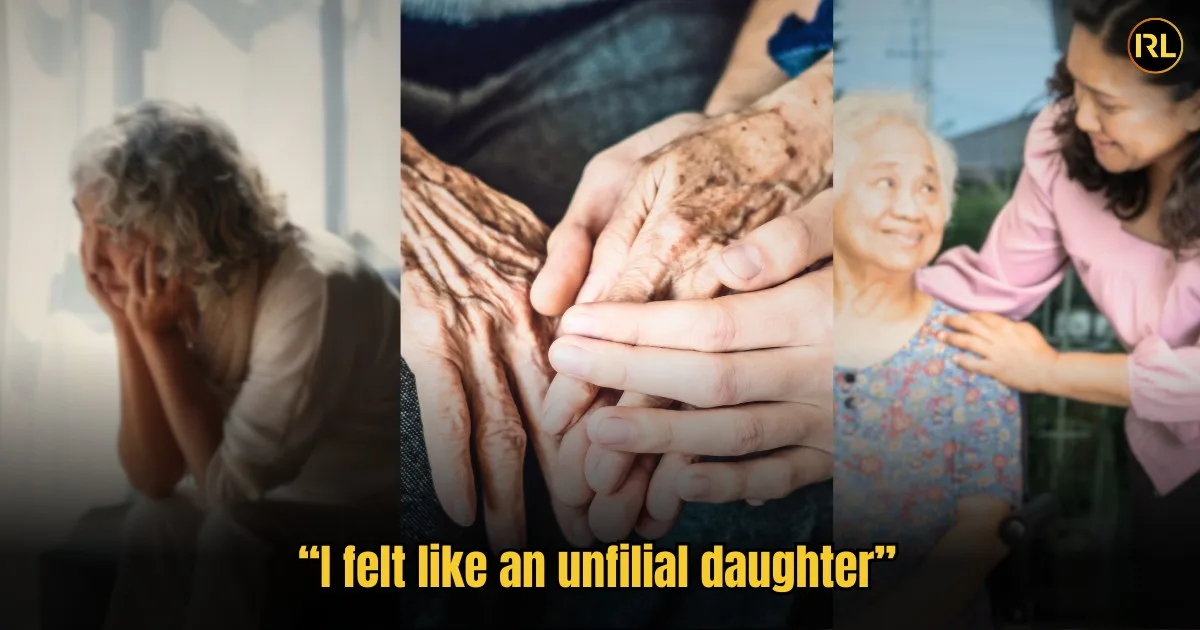
This story is about an only daughter’s extremely difficult choice to place her mother in a care home after she was diagnosed with Alzheimer’s and Parkinson’s.
I am an only child, aged 38, and with one living parent. My father passed away when I was young, leaving my mother to raise me alone.
My mom is now 78 years old, and she is diagnosed with Alzheimers and Parkinson’s. When she was first diagnosed a few years back, I promised myself I would be there for her as she was for me.
The reality of taking care of someone with Alzheimer’s
Then the reality of caretaking for an Alzheimer’s patient hit hard. At first, she just forgot who I was or where we were going, and I would gently remind her. Those were the easy days.
Over time, her memory loss slowly got worse. She would not recognize my house anymore, and would try to pack her stuff to leave, claiming she needed to go “home”.
At this point, I had to get a live-in helper to care for her full time as I was the only financial provider for her health and medical care.
“My mother would become aggressive with my helper, hitting her until she had to leave for her own safety.”
Less than a year in, her Alzheimer’s got worse, and she started getting aggressive. She would try to hit our helper, who sometimes had to lock herself in her room for safety.
I did everything I could – I learnt more about the disease, hired part-time nurses, and installed CCTV cameras in the house to keep an eye on her comings and goings.
She would wake up in the middle of night, lost in my house, trying to leave. I would have to calm her down, and bring her back to bed and wait for her to fall asleep. When this kept happening for many nights, I started losing sleep over her situation.
The sleepless nights were affecting my career
This started to affect my work. First I started showing up late, then I became distracted during work hours. My attention was constantly split between my job and checking in on my mother and the helper to address any emergencies.
I have to be honest, it really took a toll on me. I could feel it, but I couldn’t stop or give up – it was my mom after all.
One day, my manager called me into his office. He sat me down and told me that my performance was going downhill.
“Your colleagues said that you caused them to miss a few deadlines. Is there anything wrong?”
He added that a few people had reported or made comments about my work performance, as they were either worried or annoyed that my tardiness had caused them not to meet their deadline.
His tone was kind, as he asked if something was wrong, and I told him everything about the situation with my mom. He was very understanding and told me I should take some time off to figure out what I need to do, so I can come back with a clearer head.
I made the hardest decision of my life
I took my manager’s advice and took a week off. The space really allowed me to breathe and slow down to evaluate the situation.
The reality was, she needed care, and I needed to make money for her care. With no siblings or relatives willing to take her in, the only option left was a home.
“That day, I learned that choosing what’s best for someone can sometimes mean accepting the hardest choice.”
I came to terms with the fact that I would be sending her to an old folks home, and that it would be better for her as she needed care, especially from people that had experienced Alzheimer’s.
By the end of the week, I arranged for her transfer to an old folks’ home with trained professionals.
It took a long time to come to terms with my decision
I came home that Sunday afternoon and cried. Hours upon hours, I cried for what I had to do.
I was disappointed in myself not being able to take care of my mother in her old age. But I had to keep reminding myself that I wasn’t abandoning my mother—I was ensuring she had the support she deserved.
If you’re facing the difficult decision of caring for a loved one with a crippling condition, remember that it’s okay to seek help. You are not failing them by admitting you can’t do it alone.
Choosing an old folks’ home is not a sign of abandonment but can be an act of responsibility, because providing them with external care is often the best way to meet their specialised needs.
Have a personal life experience to share?
Submit your story and be heard.
Email us at ym.efillaerni@olleh and you may be featured on In Real Life Malaysia.
Also read: The Heartbreaking Reality of Losing My Mother to Alzheimer’s Disease
The Heartbreaking Reality of Losing a Mother to Alzheimer’s Disease
More from Real People
‘A RM100 fee cost a company 5 years of revenue’ shares M’sian
This story is about a Malaysian who learned that bureaucracy can be defeated simply by not arguing with it.A billing …
‘I quiet-quit, upskilled, and tripled my salary,’ shares M’sian engineer
This story is about a Malaysian who learned that loyalty without leverage leads nowhere in the corporate world.After years of …
‘I did everything right, and it still wasn’t enough’ shares M’sian graduate
This story is about a Malaysian graduate navigating big dreams in a job market where a degree no longer guarantees …















